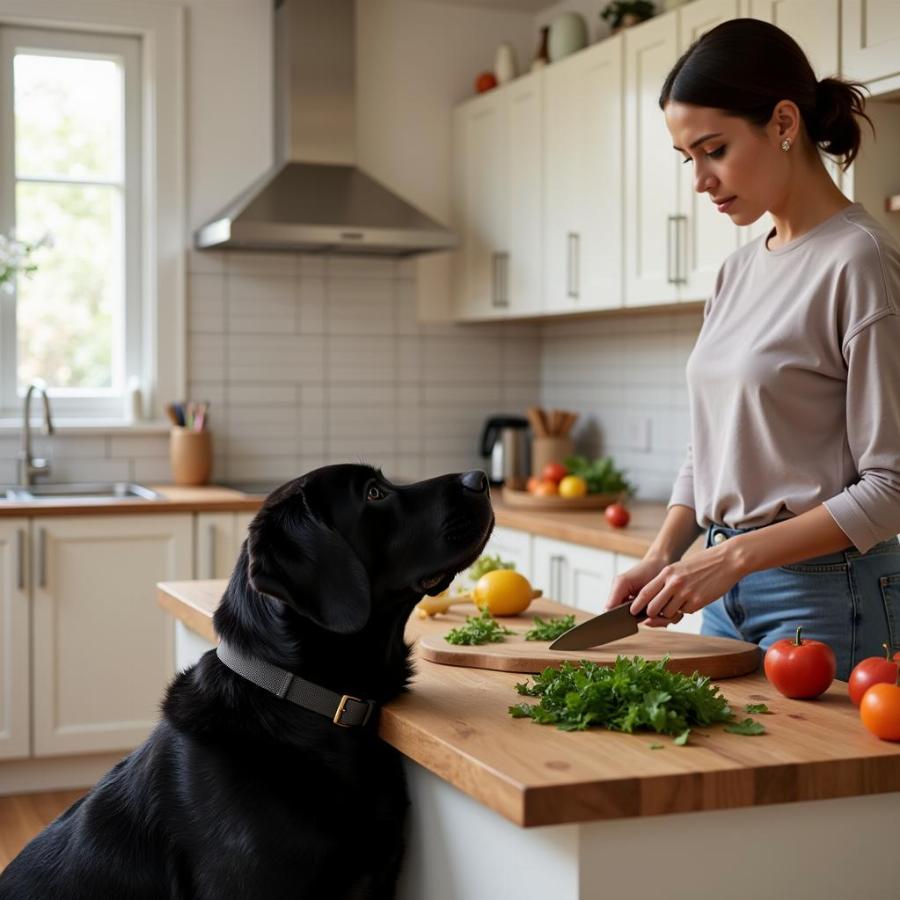You love adding fresh herbs to your meals, but you might be wondering: can dogs eat chives? While many human foods are safe for our furry friends, chives are not one of them. In fact, chives can be toxic to dogs, causing a range of unpleasant and even dangerous symptoms.
Why Chives Are Bad for Dogs
Chives, along with onions, garlic, leeks, and shallots, belong to the allium family. These plants contain compounds called thiosulfates, which are toxic to dogs. When ingested, thiosulfates can damage red blood cells, leading to a condition called hemolytic anemia.
Hemolytic anemia occurs when red blood cells are destroyed faster than the body can replace them. This can lead to a variety of symptoms, including:
- Weakness and lethargy
- Pale gums
- Loss of appetite
- Vomiting and diarrhea
- Increased heart rate
- Difficulty breathing
- Dark-colored urine
In severe cases, hemolytic anemia can be life-threatening.
How Much Chives is Toxic to Dogs?
The toxicity of chives to dogs depends on several factors, including the size of the dog, the amount ingested, and the dog’s individual sensitivity. However, it’s important to remember that even small amounts of chives can be harmful.
It’s always best to err on the side of caution and avoid giving chives to your dog altogether.
What to Do If Your Dog Eats Chives
If you suspect your dog has eaten chives, it’s important to contact your veterinarian immediately. Even if your dog isn’t showing any symptoms, it’s crucial to seek professional advice, as symptoms can sometimes take a few days to appear.
Your veterinarian will likely recommend bringing your dog in for an examination. They may also recommend tests to assess your dog’s red blood cell count and overall health.
Depending on the amount of chives ingested and the severity of your dog’s symptoms, treatment may include:
- Inducing vomiting
- Administering activated charcoal to absorb the toxins
- Providing supportive care, such as fluids and oxygen therapy
Safe Alternatives to Chives for Dogs
If you’re looking for flavorful and healthy additions to your dog’s diet, there are plenty of safe alternatives to chives. Some great options include:
- Basil: This aromatic herb is safe for dogs and adds a touch of sweetness to meals.
- Cilantro: Cilantro is another safe herb for dogs and can help freshen breath.
- Dill: Dill is a flavorful herb that can aid in digestion.
- Parsley: Parsley is a nutritious herb that can help cleanse the digestive tract.
sweet potato chips for dogs are a tasty and healthy treat that you can make at home.
Always introduce new foods to your dog gradually, and monitor them for any adverse reactions.
Can Dogs Eat Chive Flowers?
No, dogs should not eat chive flowers either. While the flowers may be visually appealing, they contain the same toxic compounds as the rest of the plant.
It’s best to keep chive plants, including the flowers, out of reach of your furry friend.
Protecting Your Dog from Toxic Foods
The best way to protect your dog from chives and other toxic foods is to be aware of the potential dangers and take preventative measures.
- Keep chives and other allium plants out of your dog’s reach: Store them in secure containers, in a cupboard or pantry where your dog can’t access them.
- Be cautious when preparing food: Don’t leave chopped chives or other ingredients containing chives unattended on counters or tables.
- Educate yourself and your family: Make sure everyone in your household knows that chives are toxic to dogs and should never be given to them.
 Dog and owner in kitchen
Dog and owner in kitchen
Conclusion
While chives may add a burst of flavor to our meals, they can pose a serious health risk to our canine companions. It’s crucial to avoid giving chives to dogs in any form, even in small amounts.
Remember, prevention is key. By taking steps to keep chives and other toxic foods away from our dogs, we can help ensure their health and well-being. If you suspect your dog has ingested chives, contact your veterinarian immediately for guidance.
FAQs
Q: What are the signs of chive poisoning in dogs?
A: Signs of chive poisoning in dogs can include weakness, lethargy, pale gums, loss of appetite, vomiting, diarrhea, increased heart rate, difficulty breathing, and dark-colored urine.
Q: Can dogs eat cooked chives?
A: No, cooking chives does not make them safe for dogs. The toxic compounds remain even after cooking.
Q: Are there any home remedies for chive poisoning in dogs?
A: There are no safe or effective home remedies for chive poisoning in dogs. If your dog has eaten chives, it’s essential to contact your veterinarian immediately.
Q: How long does it take for chives to affect a dog?
A: Symptoms of chive poisoning can appear anywhere from a few hours to a few days after ingestion.
Q: Can dogs eat garlic powder?
A: No, garlic powder, like all forms of garlic, is toxic to dogs and should be avoided.
Q: My dog ate a small amount of chives, should I be worried?
A: Even small amounts of chives can be harmful to dogs. It’s best to contact your veterinarian for advice, even if your dog isn’t showing any symptoms.
does cayenne pepper hurt dogs Learn about the potential risks of this common spice.
Looking for More Information?
Want to learn more about keeping your dog safe from common household toxins? Check out these related articles:
About Beaut Dogs
Beaut Dogs is your go-to resource for all things dog-related, providing trustworthy and in-depth information about the canine world. We are dedicated to helping you provide the best possible care for your furry friend. For personalized support and expert advice, reach out to us at [email protected].